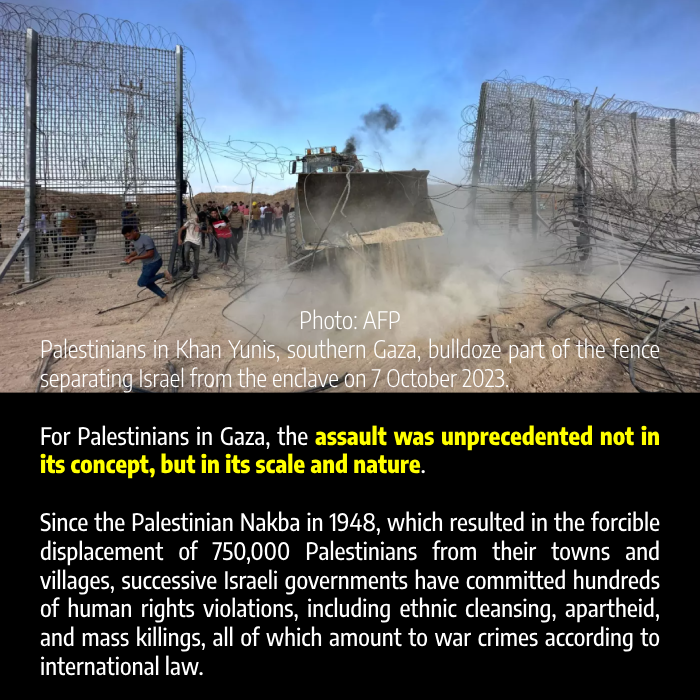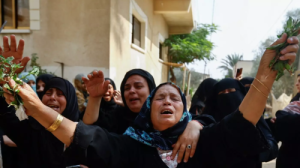By Maha Hussaini.

For the first time in decades, Israel called the conflict with Palestinians a state of war.
“We are at war,” Israel’s Prime Minister Benjamin Netanyahu said in a recorded statement on Saturday, following a military attack on Israel launched by Hamas in the early hours.
But for Palestinians, being at war is an enduring reality that has shaped their daily lives for the past seven decades.
Since the Palestinian Nakba in 1948, which resulted in the forcible displacement of 750,000 Palestinians from their towns and villages, successive Israeli governments have committed hundreds of human rights violations, including ethnic cleansing, apartheid, and mass killings, all of which amount to war crimes according to international law.
While Palestinians have long said that Israel’s practices are part of a war waged against their very existence, Israel has managed to get away with its violations, enjoying complete impunity that has lasted for more than 75 years.
Breaking the restrictions
At 6.30am on Saturday, residents in Gaza were abruptly awakened by the sound of explosions reverberating through the blockaded Strip. By this time, it was not another Israeli military assault; rather, it was barrages of Palestinian homemade rockets launched towards several towns and cities in Israel.
A few minutes passed before footage of the military operation started circulating on social media. For the first time in 17 years, Palestinians from Gaza were seen infiltrating into Israel and the occupied Palestinian territories without restrictions.
With the Gaza border closed, patients were denied access to medical treatment in the West Bank
Many of those fighters, mostly young men, have never seen the other side of Gaza’s external borders.
They were recorded celebrating as they passed through the Israeli-controlled Erez crossing, something the vast majority of Gaza’s two million residents are not allowed to do, including thousands of Palestinian patients denied access to medical treatment in the occupied West Bank. In 2022, this led to the deaths of at least four patients from Gaza, including a 19-month-old toddler.
By van, motorcycle, and on foot, both armed and unarmed, dozens of Palestinians rushed into the occupied territories with a sense of freedom they had not experienced since the imposition of the blockade on the coastal enclave in 2007.
Expected escalation
According to Hamas, its military wing, Al-Qassam Brigades, carried out the attack in response to the desecration of the Al-Aqsa Mosque and Jerusalem, as well as the increasing settler violence against Palestinians.
While the attack is described as “surprising” by many, an escalation of events was undoubtedly expected, given Israel’s tightening of restrictions and the rise in assaults across the occupied Palestinian territories during the past few months.
In the first nine months of 2023 alone, Israel has killed at least 230 Palestinians, a level of violence that has already exceeded the total death toll during 2022. It is also the highest recorded number of casualties in the ongoing conflict between Israel and the Palestinians since 2005, according to the United Nations.
Indeed, during just the first half of this year, at least 1,148 Israeli settler attacks against Palestinians were recorded. This almost equals the 1,187 attacks documented during the entire previous year.
This rise in Israeli military and settler brutality signifies an unprecedented level of violence across all the Palestinian territories, fueled and encouraged by a troubling sense of impunity and a lack of accountability for those responsible.

There will be little sympathy in the West as, yet again, besieged Palestinians are bombed by Israel, the immense suffering justified by the term ‘Israeli retaliation’.
READ: The West’s hypocrisy towards Gaza’s breakout is stomach-turning
Residents of Gaza have been talking of a fresh escalation since the early months of 2023: those discussions became ever more prominent both during and following each Israeli surge in violence in the occupied territories.
And for them, the attack by Palestinian armed factions against Israel this weekend was not so much a surprise in concept as in scale and nature, both of which were unprecedented in the history of the Israeli-Palestinian conflict.
The expectation is that Israel’s response will not significantly differ in nature and impact from its previous assaults on the Gaza Strip.
During its military offensives in 2008-2009, 2014, and 2021, for instance, Israel systematically wiped out entire families, obliterated neighbourhoods, and targeted various facets of essential infrastructure in the blockaded enclave.
Residents in Gaza expect that the current Israeli operation will continue for a longer period. But they have already endured seven decades of brutal assaults and long understood that Israel does not need a specific pretext to initiate another devastating attack on the strip.
Maha Hussaini is an award-winning journalist and human rights activist based in Gaza. Maha started her journalism career by covering Israel’s military campaign on the Gaza Strip in July 2014. In 2020, she won the prestigious Martin Adler Prize for her work as a freelance journalist.
Source: Middle East Eye. 9 Oct 2023